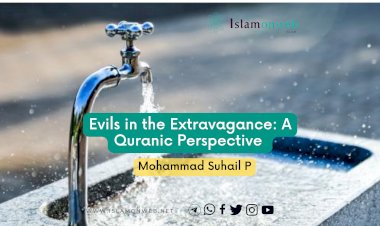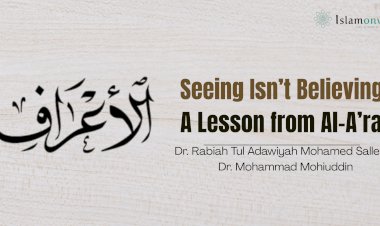From Guilt to Guidance: Finding the Qur'an in Life's Simple Moments
"Yes, I am not perfect. No, I am not always pure. But I am human — and the Qur'an was revealed for people like me."
In an age of glowing screens, endless opinions, and fleeting attention, the Qur'an can feel both so near and yet so far. Many young Muslims feel a subtle whisper when they try to pick up the Qur'an: "You're not worthy." "You're too sinful. “You don't deserve to read this holy book, “you are not Sheikh,” Or it looks like a heavy task to read the Quran with translation and Tafseer while they have the latest facilities of learning. and I’ve heard those whispers, too. Many times. But today, I want to share something with you — not just advice, but experience. Because Alhamdulillah, I've walked this path, and I've sat in those dark, humble moments. I've doubted myself, yet I've kept reading. And today, after 9 years (18 to 26 age) of quiet, often lonely effort, I've finished 15 volumes of Tafsir Ma'ariful Qur'an — not as a scholar, but as a human and as a seeker.
1- Step One: Silence the Inner Critic
When you start reading the Qur'an — especially with translation and Tafsir — guilt can hit you like a wave. "Who am I to read this?" Let me tell you: You are exactly who it was revealed for. The Qur'an doesn't expect perfection. It reminds us of our flaws, our weaknesses, and our capacity to return. The Qur'an knows you. And it still invites you. Allah reminds us in Surah An-Nisa (4:110): "Whoever commits evil or wrongs themselves then seeks Allah's forgiveness will certainly find Allah All- Forgiving, Most Merciful.". This verse speaks directly to that inner critic. Allah knows we will make mistakes, yet He still invites us to return to His words.
2- Step Two: Start Where You Are — Literally
Take Ablution (Wudu) and just start reading, don’t need a perfect setting. Some of my deepest reflections happened lying on the floor, between cleaning the house and cooking. Don't wait for the perfect lighting, the ideal room, or the most spiritual moment. Just start. Even if it's 5 minutes. Even if it's one Aya. The Environment Doesn't Have to Be Beautiful — But Your Intention Should Be, as Allah said in the Quran, “that is not touched except by the purified ones.” (56:79). I'll never forget my first Qur'an class — broken walls, a dim room, and yet, a teacher who smiled warmly and said, "As- salamu 'alaykum wa rahmatullah." That class wasn't Instagram-worthy, but it changed my life. And all the time I remember the beautiful call of Allah in Surah Al-Hadid (57:4): And He is with you wherever you are. These simple words can connect your heart to your creators as you begin your journey with the book of Allah.
3- Step Three: Break it Down into Pieces
In the beginning, when we look at the tafsir of the Qur’an, it can feel overwhelming—10 volumes, 11 volumes or 15, or even more. A voice comes to our mind saying, “Oh, this is too much! How can
I ever read it all? Surah Al-Baqarah is so long—I can't finish it,” and similar thoughts. But here’s the good news: You don’t need to start with Surah Al-Baqarah. Instead, begin with smaller portions like Surah Al-Fatiha or Surah Kusar or any surah that attracts you the most —start with their translation and tafsir. Print them out verse by verse and keep them easily accessible for daily reading. Start Small — You Don’t Have to Begin with Surah Al-Baqarah. Instead of diving into the longest Surah right away. These are powerful yet concise, and offer deep meaning that’s easier to grasp at the beginning. Use Simple and Practical Methods: Print the verses one by one with their translation and tafseer. Keep them accessible — stick them on your wall, desk, or fridge. Save them in your phone, tablet, or laptop. Use Qur’an study apps, audio tafseer, or short videos. Break your study into small goals — even 1 Ayat a day is progress! The Goal Isn’t Speed — It’s Connection. You’re not in a race. The Qur’an is a lifetime journey. What matters is that you connect with its meaning, reflect, and grow spiritually with each verse, no matter how slowly you go. Try different tools and methods to help you reach your goal. Save the verses and tafsir on your phone, your laptop, wherever it’s easy for you to access. Make it simple, make it consistent, and take it step by step.
4- Step Four: Be curious about the Ayat of the Qur’an.
Build a strong motivation in your heart that automatically drives you to read the translation and understand the meaning of the Qur’an. Ask yourself why, what, and how—develop a deep desire to uncover the reasons behind the revelation of each ayah. For example, I have a strong desire in my heart that motivates me to understand the reason certain Ayat were revealed. I truly want to know the meaning of the words I recite in my salah. Why do we read At-Tahiyyat in the final sitting of our prayer? Why do we say Subhana Rabbiyal in sujood? These questions push me toward the tafsir of the Qur’an—to seek knowledge, to explore every detail, and to connect deeply with the words of Allah.
5- Step five: Don't Just Read — Reflect
Reading the Qur'an without translation or Tafsir may bring peace, but it won't always bring transformation. The real shift came when I started reading Surah Hadid with meaning and reflecting in Maʿrifat al-nafs wa maʿrifat Allah Ufuq Institution in Balkh, Afghanistan by the teaching of Prof. Nasier Ahmad Mushfiq and Prof Wahid Rahimi. This Surah took me a 1 year to understand and reflect on. Not because I'm slow. But because some ayahs sink in slowly, changing the way we see life, loss, wealth, and faith. For example, in surah of Hadid Allah said, “On that Day you will see believing men and women with their light shining ahead of them and on their right…” (57:12) and “Has the time not yet come for believers’ hearts to be humbled at the remembrance of Allah and what has been revealed of the truth….” (57:16), “Know that Allah revives the earth after its death” (57:17) and in 28 Aya “˹And˺ He will grant you a double share of His mercy, provide you with a light to walk in”. I built my life on this surah. Yes, Allah created the world during the 7 days to teach us don't need to rush.
6- Step Six: Accept Yourself While You Grow
You may not be "good enough" by your standards. That's okay. The Qur'an says: "Indeed, we offered the Trust to the heavens and the earth and the mountains, and they declined to bear it... But man [undertook it]; indeed, he was unjust and ignorant." (Surah Al-Ahzab, 33:72). Yes, we are forgetful. Yes, we sin. Yes, we fail. But we also seek, and that's what the Qur'an asks of us — to keep returning. Even the brothers of Prophet Yusuf, after their serious wrongdoing, found the courage to say. "They begged, 'O our father! Pray for the forgiveness of our sins. We have certainly been sinful.'" (Quran 12:97). Their story reminds us that acknowledging our mistakes is the first step toward growth.
Conclusion:
Change doesn't come before Qur'an — it comes from it. Read First. Practice Will Follow. Many people get stuck thinking they can't read the Qur'an until they're ready to practice everything it commands. But that's backwards. Read first. Understand. Reflect. The Qur'an itself guides us: This beautiful description of Allah as "Al-Wadud" (All-Loving) reminds us that He actively loves those who turn to Him, regardless of their past. Message to the Youth of This Century, to every young Muslim reading this, feeling unworthy, uncertain, or overwhelmed: You're not alone. You're not too far gone. You don't need to be perfect to start. Take Ablution (Wudu) and just start reading. in your bed, in your kitchen, on your floor — just read. One ayah at a time, one page at a time. With your heart open and your soul humble. The Qur'an came for people like you and me, not saints, but seekers.
Finally,
- Quiet the voice that doubts you, and let your heart rise with the guidance of the Qur’an.
- Keep Qur’anic verses close—print them, display them, save them, and use apps or audio so their guidance is always within reach.
- The Qur’an may comfort your heart, but only understanding it through translation and tafseer can truly transform your life.
About the author:
Waresa Azizi is a Master’s student at the Department of Fiqh and Usul al-Fiqh, IIUM. Originally from Afghanistan, she specializes in Islamic women’s rights and Islamic law. Her vision centers on empowering women through Islamic education and promoting social justice. Despite cultural challenges, she has consistently worked to present authentic representations of Muslim women in the media and has participated in various conferences on women’s empowerment. Currently pursuing her studies under the IIIT-IIUM scholarship, she aims to develop balanced leadership approaches that harmonize religious values with global realities.waresa62@gmail.com
Disclaimer
The views expressed in this article are the author’s own and do not necessarily mirror Islamonweb’s editorial stance.
























Leave A Comment